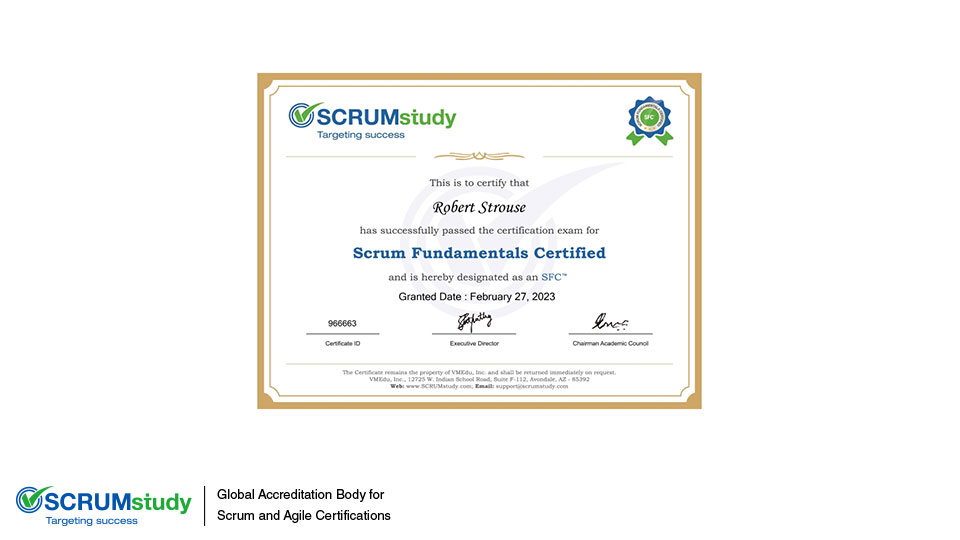Scrum Master certification exam practice software
Posted by SCRUMstudy® on July 04, 2024
Categories: SBOK® Guide
Using practice software for the Scrum Master certification exam can significantly enhance your study efforts. These tools offer a range of features, including simulated exams, timed quizzes, and detailed feedback on performance. They provide a comprehensive review of key topics such as Scrum roles, events, and artifacts, helping to identify knowledge gaps and track progress. Some software also includes interactive elements, such as flashcards and scenario-based questions, to deepen understanding. By incorporating practice software into your study routine, you can build confidence, improve time management skills, and increase your chances of passing the certification exam.
Preparing for the Scrum Master certification exam involves several effective strategies. First, candidates should thoroughly understand the roles and responsibilities of a Scrum Master, including their servant leadership role and facilitation skills. It's crucial to grasp the Scrum framework comprehensively, including its ceremonies like Daily Standups, Sprint Reviews, and Retrospectives. Practicing with mock exams helps in familiarizing oneself with the exam format and types of questions. Additionally, focusing on Agile principles such as collaboration, flexibility, and continuous improvement enhances understanding. Finally, reviewing real-world case studies and scenarios from the SBOK Guide reinforces practical application of Scrum principles, preparing candidates to confidently navigate the exam and excel as certified Scrum Masters.
A Scrum Certification Practice Exam is a preparatory tool designed to help individuals assess their knowledge and readiness for actual Scrum certification exams. By taking practice exams, candidates can identify areas where they need further study, gain familiarity with the test structure, and build confidence in their ability to pass the certification exam. This preparation is crucial for achieving certification and demonstrating proficiency in Scrum practices.
Scrum Certification Online offers professionals the flexibility to gain recognized credentials in Scrum and Agile methodologies through accessible and convenient online courses. These programs provide comprehensive training on key Scrum roles, principles, and practices, allowing participants to study at their own pace and from any location. Online Scrum certifications, such as Scrum Master, Scrum Product Owner, and Scrum Developer, equip individuals with the skills needed to effectively manage and contribute to Agile projects.
The Scrum certification online exam serves as a comprehensive assessment tool for individuals seeking validation of their Scrum knowledge and expertise. Through this exam, candidates are evaluated on their understanding of key Scrum principles, roles, events, and artifacts. The exam covers essential topics such as Scrum framework, Agile methodologies, Scrum roles (Product Owner, Scrum Master, Development Team), Scrum events (Sprint, Sprint Planning, Daily Standup, Sprint Review, Sprint Retrospective), and Scrum artifacts (Product Backlog, Sprint Backlog, Increment). Successful completion of the exam demonstrates proficiency in Scrum practices and principles, making it a valuable credential for professionals aspiring to excel in Agile project management roles.
We will attempt to do a quick overview of some of the Scrum certifications that are currently being offered.
Next, let's discuss how to choose the right Scrum trainer. While it can be beneficial to find a Scrum trainer with a similar background to yours, it is not an absolute requirement. The framework and style of Scrum training can vary from trainer to trainer, so it's important to find one that matches your learning style.
The biggest positive of a formal Scrum training is that you learn everything in a controlled environment. You meet people who are also there to learn about Scrum and in case you have common background, it helps to understand the process and difficulties of implementation from outsider’s point of view. A formal training also helps you understand about the mistake which you may make due to the traditional project management concepts rooted in you.
The main purpose of any certification is to impart a common baseline of the knowledge. These Scrum certifications, compared to any other project management certifications have a very easy test. You should remember that getting a Scrum certificate is way easier than the implementing actual Scrum framework.
Scrum and Agile methodologies offer significant flexibility in implementation. However, it's crucial to maintain the core principles of the process. Project managers who modify essential elements of Scrum are often referred to as "Scrumbut." It is generally recommended to adopt Scrum in its entirety initially to fully understand its mechanics. Once you have a solid grasp of the framework, you can then make informed decisions about potential adjustments. Over time, you may realize that no changes are necessary.
You need to understand that nothing is more valuable than experience. Scrum or Agile Certification may only add some credibility and marketability to the individual.

